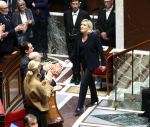You are here
Democracy in the digital age
Apr 09,2018 - Last updated at Apr 09,2018
Anyone who follows politics, as I do, must be fascinated by the elections that take place all over, how they are conducted, and how people react to their results.
Before, the information revolution elections in foreign countries used to receive barely a mention in news bulletins. But today, we get tonnes of information about elections and about the juicy muck behind them, which raises the question of whether democracy exists at all.
Proponents of democracy believe that all people have inalienable rights, such as the right to life, liberty and property. Government, they argue, is the result of a social contract where people conditionally transfer some of their rights to the government in order to better ensure the stable, comfortable enjoyment of their lives, liberty and property. And if the government fails to protect these rights, people can reboot the system and replace the government with another.
These views, which are largely associated with 17th century philosopher John Locke, are not widely known in the Middle East, any more than Locke himself. Better known and frequently misquoted is Niccolo Machiavelli, who lived and wrote two centuries before Locke, at a time when people were largely uneducated and attached to the illusion of a glorious past.
Machiavelli believed that a ruler’s objective is to maintain his power, hence stability, as Machiavelli understood it. To do so, the ruler should ensure that people obey him, preferably out of love and fear. But if a choice is necessary, he is more secure to be feared than loved. Virtue, on the other hand, is superfluous because hatred can be gained as much by good works as by evil.
Therefore, many people in the Middle East, and elsewhere, used to vote in resignation, believing that, if their votes mattered, they would not be allowed to vote at all, and some envied the countries where voters make a difference through their votes. But now, questions are asked whether they do indeed.
The closer we look, the more we realise that election results are determined largely by the action of pressure groups and by large campaign donations. Then, as if this were not bad enough, data mining companies stepped in, to collect online data of more than 50 million social media users and exploit this data to influence election results.
All this seems to support Joseph Stalin’s view that people who cast the votes decide nothing. The people who count the votes decide everything.
But could this be the ultimate truth? Fortunately, not. One virtue of democracy is that it is the only system that can persistently ask the powers that be whether they are the powers that ought to be.
Moreover, the revelation that led to the investigation of C Analytica’s activities came from a whistleblower. This supports the belief that the virtue of one man can make a difference. His good example may inspire good men to imitate him, and then the wicked are ashamed to lead a life so contrary to this example.
We can but hope.













